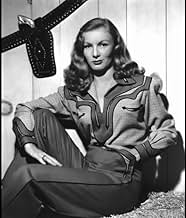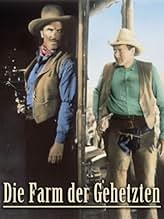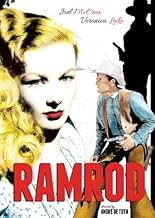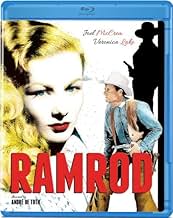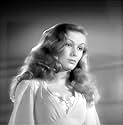Story about violent feud between Connie Dickason, the owner of the Circle 66 ranch and rancher Frank Ivey, the self-proclaimed boss of an otherwise public grazing land.Story about violent feud between Connie Dickason, the owner of the Circle 66 ranch and rancher Frank Ivey, the self-proclaimed boss of an otherwise public grazing land.Story about violent feud between Connie Dickason, the owner of the Circle 66 ranch and rancher Frank Ivey, the self-proclaimed boss of an otherwise public grazing land.
Charles Ruggles
- Ben Dickason
- (as Charlie Ruggles)
Houseley Stevenson
- George Smedley
- (as Housely Stevenson)
Ward Wood
- Link Thoms
- (as Robert Wood)
Victor Potel
- Burch Nellice
- (as Vic Potel)
Featured reviews
This was a surprisingly brutal western, more like a film noir from the late 1940s, with rough characters who shot first and thought later.
Among those with the rough attitudes was the female lead, Veronica Lake, who was nearing the end of her short career. Without the makeup and long blonde hair, she didn't look that pretty. The good guys were played by Joel McCrea and Donald Crisp.
Almost everyone in this film gets shot or killed. Many critics labeled this a B-movie but it sure had a lot of well-known actors for that label. Preston Foster, Don DeFore and Lloyd Bridges also star. The only actor who sounded B movie-ish was Arleen Whalen. Despite her good looks, I can see why she never made it to stardom.
I like black-and-white but this was film that would have looked better in some nice Technicolor with the great mountain scenery that was featured.
Among those with the rough attitudes was the female lead, Veronica Lake, who was nearing the end of her short career. Without the makeup and long blonde hair, she didn't look that pretty. The good guys were played by Joel McCrea and Donald Crisp.
Almost everyone in this film gets shot or killed. Many critics labeled this a B-movie but it sure had a lot of well-known actors for that label. Preston Foster, Don DeFore and Lloyd Bridges also star. The only actor who sounded B movie-ish was Arleen Whalen. Despite her good looks, I can see why she never made it to stardom.
I like black-and-white but this was film that would have looked better in some nice Technicolor with the great mountain scenery that was featured.
10mi6nick
Contrary to previous reviews of Ramrod, de Toth's film is much more interesting than a "simple cattle vs. sheep" plot-driven western. Just look at Lake's Connie Dickinson. This is a typical femme fatale archetype taken straight from film noir (realistically, the character derives from hard-boiled pulp literature which Luke Short fused with his western story).
Sexually alluring Connie uses her potent sway over men to achieve her greedy ambitions of wealth and power, and is unafraid to send men to their deaths for her cause. Connie's strength of character is atypical of the western genre at this stage, and her strength seems to come from the relative weakness of the film's hero, played by Joel McCrea; who seems to lack the strong sense of moral certainty that the typical westerner was founded upon.
Along with Raoul Walsh's Pursued (1947), and Robert Wise's Blood on the Moon (1948), Ramrod stands as one of the few hybrids between film noir and the western. Regardless of your standpoint on the status of film noir, all of these films contain typical elements from the pessimistic noirs of the 40's and 50's, particularly formal and stylistic devices, as well as recurring personnel, especially directors, stars (ie. Robert Mitchum), and cinematographers. Crucially though, the western genre before this stage was a particularly optimistic one; look at Stagecoach (John Ford, 1939), Dodge City (Michael Curtiz, 1939), or even My Darling Clementine (Ford again, 1946); the three films I mentioned beforehand, including Ramrod, all offer instances of pessimistic worldviews, and morally ambiguous characters and situations, even though they all end with the hero getting the girl and riding into a westward sunset.
Sexually alluring Connie uses her potent sway over men to achieve her greedy ambitions of wealth and power, and is unafraid to send men to their deaths for her cause. Connie's strength of character is atypical of the western genre at this stage, and her strength seems to come from the relative weakness of the film's hero, played by Joel McCrea; who seems to lack the strong sense of moral certainty that the typical westerner was founded upon.
Along with Raoul Walsh's Pursued (1947), and Robert Wise's Blood on the Moon (1948), Ramrod stands as one of the few hybrids between film noir and the western. Regardless of your standpoint on the status of film noir, all of these films contain typical elements from the pessimistic noirs of the 40's and 50's, particularly formal and stylistic devices, as well as recurring personnel, especially directors, stars (ie. Robert Mitchum), and cinematographers. Crucially though, the western genre before this stage was a particularly optimistic one; look at Stagecoach (John Ford, 1939), Dodge City (Michael Curtiz, 1939), or even My Darling Clementine (Ford again, 1946); the three films I mentioned beforehand, including Ramrod, all offer instances of pessimistic worldviews, and morally ambiguous characters and situations, even though they all end with the hero getting the girl and riding into a westward sunset.
Hadn't seen this movie in years so I decided to watch it again. I have to say there was a lot that I had missed in previous viewings. Mainly this is definitely a noir western. The basic plot is a staple of westerns, cattlemen versus sheepmen and a range war, but the characters walked straight of the 1940s. You have Veronica Lake as the femme fatale using her charms to twist multiple men to do her bidding. There's Joel McCrea as a flawed hero and Don DeFore as his friend with a dark side. Donald Crisp plays the by the book sheriff, arguably the only major conventional western character in the movie.
Definitely worth watching if you've never seen it before. If you want another noir western to watch try Blood On The Moon with Robert Mitchum.
Definitely worth watching if you've never seen it before. If you want another noir western to watch try Blood On The Moon with Robert Mitchum.
She may have been tiny, but she could hard-eye stare as well as any man, and make you believe it. It's that quality that this complex Western turns on, and fortunately the blonde Veronica Lake delivers in spades. It's not like she's the only good actor in the cast. There's the reliable Joel McCrea as the good guy, the commanding Donald Crisp as the sheriff, and Don De Fore in a sly role as McCrea's buddy, showing both an easy grin and a tricky set of values.
Usually it's two patriarchal land barons who feud over territory. Here it's not. It's the tiny Lake and bad guy Preston Foster who are duking it out, both fair and foul. What makes this Western more interesting than most is that Lake and DeFore fit somewhere between the poles of good-guy bad-guy. You never quite know what they'll do next because their moral compass sometimes wobbles. Being a woman with a lot of ambition, Lake has to finagle men into doing her shooting for her, and guess how she does that. And being a man who likes women, DeFore has figure out how to balance his loyalties. That makes for some interesting situations.
Director Andre DeToth (check out his unpronounceable real name) is the perfect overseer for a plot that features quiet treachery, hidden motives and raw violence. Maybe that's because his middle-European background was steeped in just trying to survive. Nonetheless, his sardonic view of human nature reminds me of an early version Sam Peckinpah. In fact, the latter hired de Toth to direct several episodes of Peckinpah's brilliant TV series The Westerner (1960). In that same vein, note de Toth's unflinching camera when filming the night battle near movie's end and when filming the treacherous backshot on Foster's front porch. It's clear he's bumping against Production Code strictures on what can be shown and what can't.
Ramrod is an underrated Western with an adult story-line. You may, however, need a score card to keep up with the various twists and turns. Still and all, the scenery's great, the acting top-notch, and the action where it ought to be. In my little book, that's definitely a can't-miss package.
Usually it's two patriarchal land barons who feud over territory. Here it's not. It's the tiny Lake and bad guy Preston Foster who are duking it out, both fair and foul. What makes this Western more interesting than most is that Lake and DeFore fit somewhere between the poles of good-guy bad-guy. You never quite know what they'll do next because their moral compass sometimes wobbles. Being a woman with a lot of ambition, Lake has to finagle men into doing her shooting for her, and guess how she does that. And being a man who likes women, DeFore has figure out how to balance his loyalties. That makes for some interesting situations.
Director Andre DeToth (check out his unpronounceable real name) is the perfect overseer for a plot that features quiet treachery, hidden motives and raw violence. Maybe that's because his middle-European background was steeped in just trying to survive. Nonetheless, his sardonic view of human nature reminds me of an early version Sam Peckinpah. In fact, the latter hired de Toth to direct several episodes of Peckinpah's brilliant TV series The Westerner (1960). In that same vein, note de Toth's unflinching camera when filming the night battle near movie's end and when filming the treacherous backshot on Foster's front porch. It's clear he's bumping against Production Code strictures on what can be shown and what can't.
Ramrod is an underrated Western with an adult story-line. You may, however, need a score card to keep up with the various twists and turns. Still and all, the scenery's great, the acting top-notch, and the action where it ought to be. In my little book, that's definitely a can't-miss package.
Veronica Lake in her memoirs said that Joel McCrea was one of the kindest, most decent men she ever knew or worked with. When she was writing that she was talking about Sullivan's Travels which is certainly one of the high points in both of their careers.
Ramrod is light years from Preston Sturges. Based on a Luke Short novel it's a pretty grim and violent film. Preston Foster is the owner of the big spread in the neighborhood and a close ally of his is Charlie Ruggles who has an adjoining piece of territory. Foster's taken a shine to Ruggles daughter Veronica Lake, but she can't stand the sight of him. When Foster bullies her fiancé out of town, Lake wants vengeance.
She's got her own piece of land now and hires Joel McCrea to run it for her. The range war starts, but Lake thinks McCrea is too soft in his approach. She starts some backchannel schemes of her own.
The result of this is a whole lot of dead bodies piling up. A windfall for the coroner.
As always Joel McCrea is the moral centerpiece of the film, he's once again the gallant western hero. Preston Foster is the town bully you love to hate. Foster did a variation on this part again in Law and Order a few years later.
Cast against type are Don DeFore and Charlie Ruggles. DeFore who was usually the hero's best friend and a jovial kind of guy, is a violence prone sort of fellow, who Lake manipulates among others. And it is hard to believe that Charlie Ruggles ever played anyone as serious on film before or since. Our image of him is usually the henpecked husband opposite Mary Boland from the Thirties.
This film is significant for Lake because she married Director Andre DeToth. DeToth claims to have been married seven times, but only three are listed on his page at IMDb. It was not a happy union, but DeToth did get a good performance out of his bride.
Ramrod may be one of the earliest examples of an adult western. It is grim and violent, but fascinating.
Ramrod is light years from Preston Sturges. Based on a Luke Short novel it's a pretty grim and violent film. Preston Foster is the owner of the big spread in the neighborhood and a close ally of his is Charlie Ruggles who has an adjoining piece of territory. Foster's taken a shine to Ruggles daughter Veronica Lake, but she can't stand the sight of him. When Foster bullies her fiancé out of town, Lake wants vengeance.
She's got her own piece of land now and hires Joel McCrea to run it for her. The range war starts, but Lake thinks McCrea is too soft in his approach. She starts some backchannel schemes of her own.
The result of this is a whole lot of dead bodies piling up. A windfall for the coroner.
As always Joel McCrea is the moral centerpiece of the film, he's once again the gallant western hero. Preston Foster is the town bully you love to hate. Foster did a variation on this part again in Law and Order a few years later.
Cast against type are Don DeFore and Charlie Ruggles. DeFore who was usually the hero's best friend and a jovial kind of guy, is a violence prone sort of fellow, who Lake manipulates among others. And it is hard to believe that Charlie Ruggles ever played anyone as serious on film before or since. Our image of him is usually the henpecked husband opposite Mary Boland from the Thirties.
This film is significant for Lake because she married Director Andre DeToth. DeToth claims to have been married seven times, but only three are listed on his page at IMDb. It was not a happy union, but DeToth did get a good performance out of his bride.
Ramrod may be one of the earliest examples of an adult western. It is grim and violent, but fascinating.
Did you know
- TriviaAt the time of filming, Veronica Lake and director André De Toth were married. This film was their first screen collaboration.
- GoofsActor Houseley Stevenson's name is misspelled onscreen as "Housely."
- Quotes
Connie Dickason: From now on, I'm going to make a life of my own. And, being a woman, I won't have to use guns.
- ConnectionsReferenced in You Must Remember This: Veronica Lake (Dead Blondes Part 4) (2017)
Details
Box office
- Budget
- $2,000,000 (estimated)
- Runtime
- 1h 34m(94 min)
- Color
- Aspect ratio
- 1.33 : 1
Contribute to this page
Suggest an edit or add missing content



